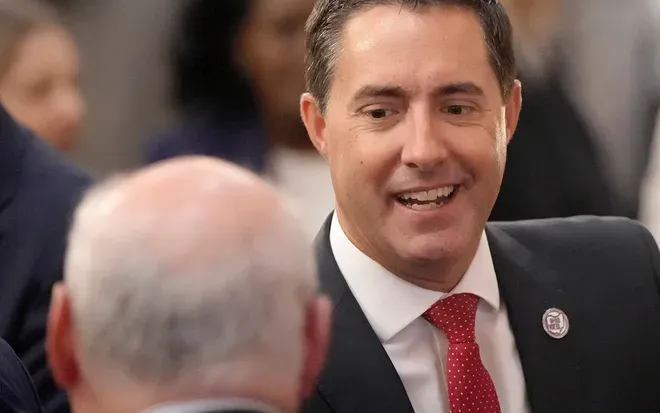In response,
LaRose issued a directive to local election officials changing how absentee ballots can be returned. Anyone helping voters with disabilities or returning a family member’s ballot − which is also allowed
under Ohio law − must bring ballots inside the board of elections office and sign a form confirming that they’re following the rules.
That means Ohioans may only place their own ballots in a drop box. Boards must post signs on the boxes outlining those instructions, which will be in place for the November election.
But LaRose wants lawmakers to go a step further. In a letter to GOP legislative leaders last week, first reported by the Toledo Blade, he urged them to revisit the state’s ban on “ballot harvesting” − a critical term for ballot collection − and potentially get rid of drop boxes down the line.
Ohio permits only one drop box per county located at the board of elections. About 34,000 people returned absentee ballots via drop box during the March primary, according to the secretary of state’s office.
“This (ruling) effectively creates an unintended loophole in Ohio’s ballot harvesting law that we must address,” LaRose wrote. “I suspect this is exactly the outcome the (League of Women Voters of Ohio) intended. Under the guise of assisting the disabled, their legal strategy seeks to make Ohio’s elections less secure and more vulnerable to cheating, especially as it relates to the use of drop boxes.”
The League’s executive director, Jen Miller, said the federal court decision was narrow and designed to protect grandchildren, caretakers and roommates from felony charges if they help a voter with a disability. She believes the new drop box rules would make things harder for voters and election workers without improving security.
“LaRose’s directive seems to be designed to intimidate elderly and disabled voters and their loved ones,” Miller said.
LaRose calls for changes as he touts Ohio voting laws
LaRose’s request came despite his frequent boasts that Ohio voting laws are secure and effective ahead of the November election.
“I’ve said consistently that I think we do a very good job in Ohio running elections,” Gov. Mike DeWine said Tuesday. “Anyone who wants to change what we do has a burden of proof showing that there is a problem with what we do now.”
In the same letter, LaRose asked GOP leaders to require proof of citizenship on voter registration forms after the U.S. Supreme Court allowed a similar policy to take effect in Arizona. Ohioans must be U.S. citizens to vote in federal, state and local elections and attest to that on the current registration form.
LaRose argued proof on the front-end would save his office time on audits of the state’s voter rolls. Election officials recently referred 597 non-U.S. citizens who were registered to vote for prosecution, including 138 who cast a ballot, according to the letter. They also removed 499 non-citizens from the voter rolls in the latest purge of registrations.
There are about 8 million registered voters in Ohio.
LaRose also called on lawmakers to require Ohioans to cast provisional ballots if their voter file doesn’t match information provided to the Bureau of Motor Vehicles or Social Security Administration. Any changes considered by the Legislature wouldn’t be in effect for the Nov. 5 election.
“This is another example of always disappointing, never surprising behavior from a politician with an ever-growing list of losses desperate to be relevant,” Ohio Democratic Party chair Liz Walters said. “LaRose knows that Ohioans see through his extreme, unpopular policies. His job is to help Ohioans vote but he tries to make it more difficult every chance he gets.”
USA TODAY Reporter Laura Bischoff contributed to this story; Haley BeMiller is a reporter for the USA TODAY Network Ohio Bureau, which serves the Columbus Dispatch, Cincinnati Enquirer, Akron Beacon Journal and 18 other affiliated news organizations across Ohio.

